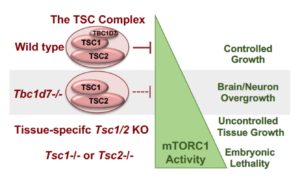
In a paper published in Cell Reports, Schrötter and colleagues describe a mouse knockout model of TBC1D7, a core component of the complex disrupted in a genetic tumor and neurological disorder called tubeous sclerosis complex (TSC).
The TSC protein complex serves as a major brake on cell and tissue growth. The other two components of the TSC complex are known to be essential for its function. However, little is known about the role of TBC1D7.
In this study, MET researchers found that mice lacking TBC1D7 develop normally but exhibit overgrowth of the brain – a condition referred to as megalencephaly. This overgrowth is reflected in larger neurons due to overactivation of a major growth regulatory pathway.
These findings demonstrate that the brain is particularly sensitive to the growth-restricting properties of the TSC complex, with even small changes in complex function impacting organ growth. The TBC1D7 knockout mice also faithfully recapitulate the major clinical manifestation of a rare human brain overgrowth disorder caused by complete loss of TBC1D7.
Click to Access Publication


